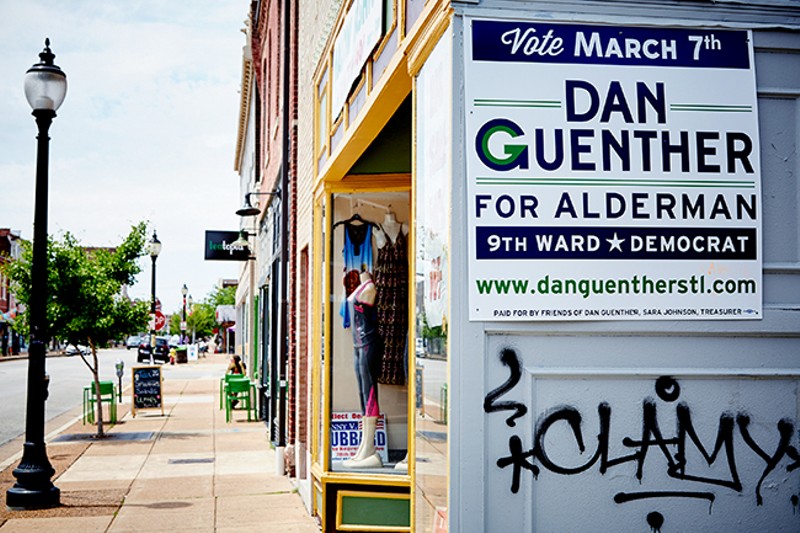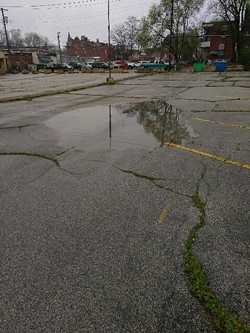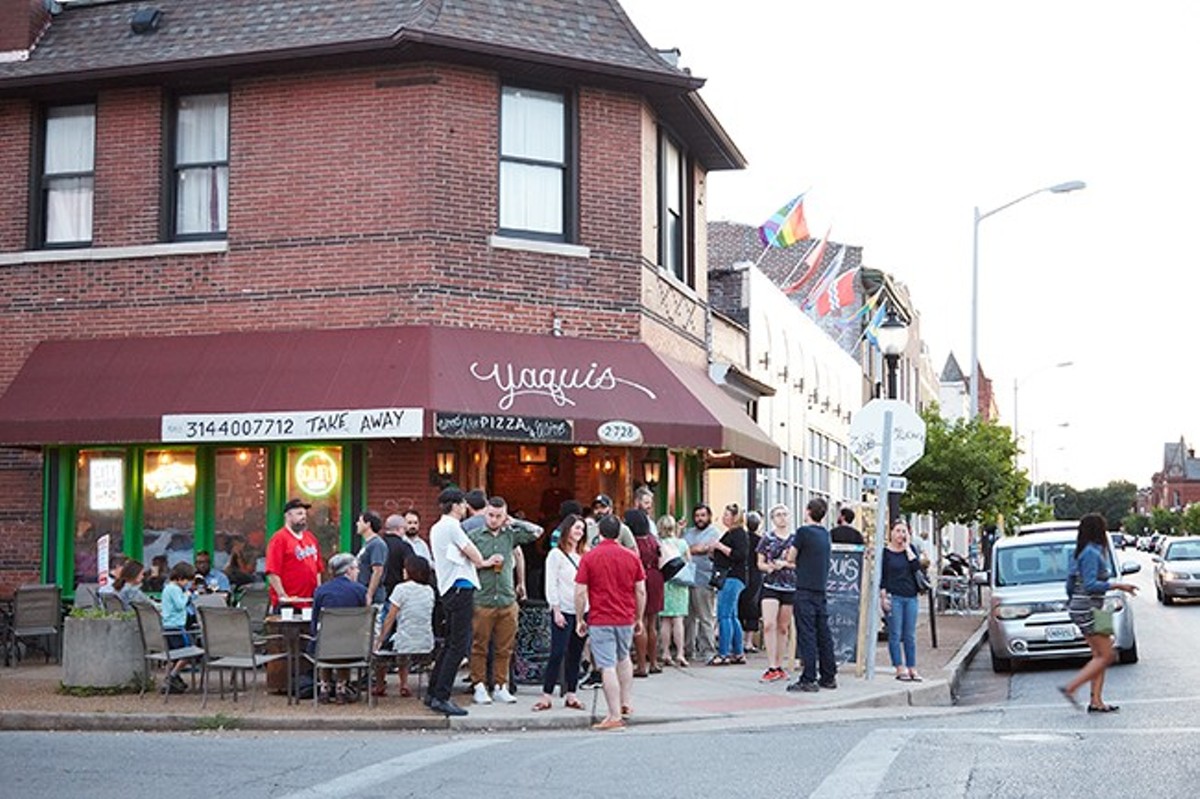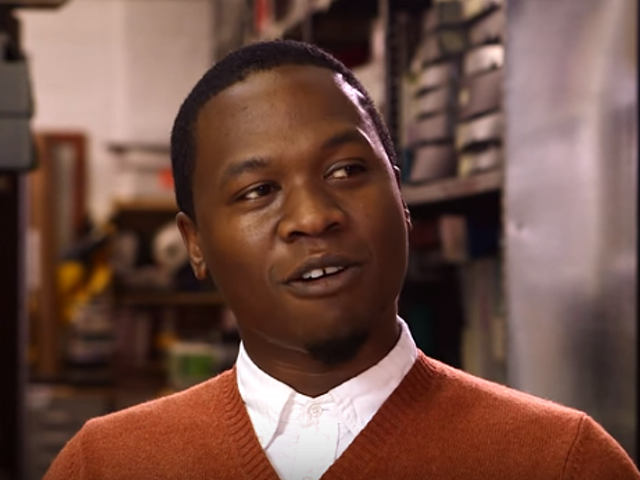
The area's crime problem was very much on Ortmann's mind. Before losing the election, he used ward funds that he'd squirreled away to buy a $437,000 system of high-tech police security cameras at ten different intersections in the 9th Ward, including at two spots on Cherokee.
The cameras, which recognize license plates, help police quickly spot stolen cars — and apprehend their drivers. They're already active downtown, but they'll be something new for Cherokee. He expects them to start arriving next month. But Ortmann's project drew some grumbling online from younger residents, who worry about heavy-handed policing and its impact on young black residents.
Schmid, too, is finding part of his legacy under fire. It turns out that the "absentee landlord" who failed to light the old bank property at Cherokee and California — the landlord against whom Francis Rodriguez railed on Facebook — was the Gravois Park Neighborhood Association. And its members had acquired that property thanks to a sweetheart deal from Schmid.
According to a spokeswoman for the city's Land Reutilization Authority (LRA), it was common in the mid-aughts for aldermen to acquire distressed properties using federal Community Development Block Grant funds, then gift those properties to constituents who promised to develop them. It was a way to subsidize renewal — or at least, that was the theory.
But renewal is not what happened at the old bank property.
Schmid did not return calls seeking comment. But the record shows that, in 2005, as part of a broader development plan for the area, Schmid used $20,000 in federal block grant funds to enable the LRA to buy the old Jefferson Heritage Bank property. He then arranged for the LRA to give it to his allies in the neighborhood association, a nonprofit that agreed in writing to "repair, fence and landscape [it] for [a] community center and retail facility." If they failed to do so within a year, the city reserved the right to reclaim the property.

A year went by, and the city never took it back. So from that point on, the association has owned it, free and clear. And today, even though it sits in the heart of a thriving commercial strip, the association has done very little with it.
According to city records, only one merchant has occupied the retail space, and only for a few years. The adjacent parking lot is nearly always chained off. Its drains have clogged, causing giant puddles to form after hard rain. Last autumn, neighbors complained to Alderwoman Spencer that criminals were taking advantage of the lot's darkness. She emailed the association's officers, concerned about the lack of "significant lighting."
"I am hoping you can update me on future plans for the site and perhaps a meeting with all involved can help us get on the same page," Spencer wrote.
Ten minutes later, she received a reply from Shirley Wallace. In the group's filings, Wallace is listed as treasurer, with an address of 2100 Cherokee. However, she doesn't own the antique business located there, much less the building it's in. In fact, public records show that Wallace is a St. Charles resident who owns no property or business in the neighborhood. Still, for more than a decade, she has continued to show up on Cherokee Street to oppose the newcomers at every turn — including Alderwoman Spencer.
Referring to the old bank property, Wallace wrote: "There has never been an incident there in more than ten years.... Significant lighting is not necessary. Our future plans are not your concern and do not require a meeting."
After the March 17 shooting, Spencer again emailed members of the association, and again, Wallace rebuffed her.
"There is a lot of empty property in the 20th ward part of Cherokee that could use your help," Wallace wrote. "We are doing just fine."
In the weeks that followed, though, the association quietly responded to its neighbors' concerns. They painted over graffiti, and set up a timed lighting system in the lot.
Secretary Dale Sweet acknowledges to the RFT that the property "has been a little under-utilized," and that they've discussed finding another retail tenant. But he insists it's their choice to make, adding, "America still has private property rights."
Gravois Park Neighborhood Association is a holdout from the days of Old Cherokee. It's not as young or dynamic as its nearby analogues, but it's not a shell organization either. Its members meet every month in the old bank office. They participate in National Night Out and a mentoring program through the city's juvenile court system. City records show they pay their property taxes.
Yet they also claim to speak for the neighborhood — for example, by making community impact statements in criminal cases. And they do that without ever holding open elections. (Both Wallace, the treasurer, and the new president, Daniel Petty, decline to speak to RFT.) In 2016, frustration over their closed elections even led to the creation of an offshoot Gravois Park group. It has since dissolved.
The group's isolation is not just cultural. The property that has everyone riled up actually lies in Benton Park West, not Gravois Park, and thanks to redistricting, it's no longer even part of the 20th Ward. It has become a physical symbol of everything that upsets Cherokee's new guard about the old one. They see it as a stubborn "no" in a neighborhood of "yes." Some even see it as publicly subsidized land speculation.
Abigail Vargas's family owns La Vallesana next door. Their corner eatery has grown from a small popsicle hut in 2003 to a large restaurant with two patios and a gazebo. She remembers asking the association twice about buying the bank property, but they told her it's not for sale.
"If they don't have a plan or something in mind, a lot of other people probably do," she says. In the meantime, she too expresses concern about criminals using the bank lot as an escape route. "They can hide back there."
Three weeks after the March 21 shooting, Francis Rodriguez and his wife Beckie Lewis attended the association's April meeting with some friends. They broached the topic of lighting in the lot.
"Our biggest problem as a business owner is crime," said Lewis. "We walk around here. There are no lights. This is a parking lot where people feel safe to deal drugs."
True or not, there was an undercurrent of political tension in her words. The neighborhood association had aligned with Schmid. Newer business owners like Lewis and Rodriguez had backed Spencer. So when Lewis segued from the topic of crime into questions about the association's funding, the exchange got heated.
"We lost our temper and the meeting just fell apart," Rodriguez said later. "You could see they weren't listening and they weren't going to move off center."






